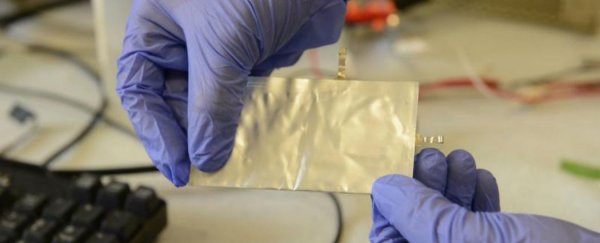A new rechargeable aluminium battery has been developed by researchers in the US, and they're saying the prototype can charge a smartphone in 60 seconds, plus it's more environmentally friendly, durable, and cheaper than anything currently on the market. And it won't spontaneously burst into flames like certain widely used lithium-ion batteries are capable of…
"We have developed a rechargeable aluminium battery that may replace existing storage devices, such as alkaline batteries, which are bad for the environment, and lithium-ion batteries, which occasionally burst into flames," said one of the team, chemist Hongjie Dai from Stanford University, in a press release. "Our new battery won't catch fire, even if you drill through it."
The new technology has done something scientists around the world have been chasing for decades - it puts aluminium to good use in the high-demand battery industry. The pros for aluminium are many, including its cheapness, availability, low-flammability, and high-charge storage capacity. But the challenge in building a viable aluminium battery has been in finding a material for the cathode - the device through which the electrical current flows - that can produce enough voltage to sustain it across a whole lot of charges.
Fortunately for the Stanford team, they found the perfect material… by accident. "People have tried different kinds of materials for the cathode," said Dai. "We accidentally discovered that a simple solution is to use graphite, which is basically carbon. In our study, we identified a few types of graphite material that give us very good performance."
The team figured out that if they placed an aluminium anode - the part through which the electrical current enters the device - together with an graphite cathode, in a solution of iconic liquid electrolyte. This arrangement was then placed inside a flexible, polymer-coated pouch, which means it could be installed in a flexible and bendy device.
"The electrolyte is basically a salt that's liquid at room temperature, so it's very safe," said one of the team, graduate student Ming Gong. They tried their prototype out on some smartphones and report that they could fully charge one in 60 seconds - a vast improvement on the several hours it currently takes lithium-ion batteries to charge our phones. Plus the battery lasts for more than 7,500 recharge cycles, while current lithium-ion batteries can only withstand about 1,000 cycles. "This was the first time an ultra-fast aluminium-ion battery was constructed with stability over thousands of cycles," the team reports.
The battery also offers a safer option for those who are a little uneasy about powering their devices using a potential fire hazard. Case in point - United and Delta airlines have recently decided to ban bulk lithium-battery shipments on passenger planes, because it's just not worth the risk.
"In our study, we have videos showing that you can drill through the aluminium battery pouch, and it will continue working for a while longer without catching fire," Dai said. "But lithium batteries can go off in an unpredictable manner - in the air, the car or in your pocket."
Sounds pretty perfect, right? It's certainly promising, but before the researchers can think about replacing all the batteries on the market, they first need to get the voltage of their batteries to meet what lithium-ion batteries can achieve.
"Our battery produces about half the voltage of a typical lithium battery," Dai said in the press release. "But improving the cathode material could eventually increase the voltage and energy density. Otherwise, our battery has everything else you'd dream that a battery should have: inexpensive electrodes, good safety, high-speed charging, flexibility and long cycle life. I see this as a new battery in its early days. It's quite exciting."
The battery will be described in an upcoming edition of Nature.

